by Dr. Dominic Corva, Social Science Research Director
This post reviews the evolution of our nonprofit think tank since we earned our own 501(c)(3) Federal designation last July, after being fiscally sponsored by Americans for Safe Access Foundation (ASAF) between Fall 2013 and July 2015.
Since founding the organization in May 2013, we have gone through three major organizational structures, all part of bootstrapping an idea about a nonprofit service into an actual, functioning think tank with a focused identity. Since January 2016, we have been busy nailing down that sustainable identity, which you can read about in our new About page. The web site itself is a bit behind, but we will gradually catch up as bandwidth permits. The constant process throughout this time was Dr. Corva’s ethnography of cannabis agriculture especially as it relates to legalization in Washington state, where the Center is centered; and Dr. Sexton’s ongoing academic research and presentation to many national and global audiences especially the International Cannabinoid Research Society.
CASP 1.0 was the rough draft, the seed from which our possibilities could be assessed for further selection. Primarily, it was comprised of Dr. Michelle Sexton, myself, and Dr. Sunil Aggarwal as founding Board members, meeting a few times a month on Google Hangout and exchanging information about the field as we saw it opening up amongst us. Dr. Sexton had a particular vantage point as a state subcontractor on cannabis rule development before and during this period; Dr. Aggarwal was finishing his NYU residency and had a more East Coast and global perspective on developments. And Dr. Corva’s perspective was informed especially by his then three-year ethnographic project on policing cannabis agriculture in Humboldt County, California. For this period, our main focus was on learning the new landscape, especially in Washington State.
CASP 2.0 overlapped with 1.0 to a degree, as it emerged from our fiscal sponsorship agreement with ASAF in Fall 2013. During this period, a melange of volunteer energy pulled CASP in many different directions, depending on what the volunteers wanted to do. This was a period in which, absent resources, we discovered and engaged community development interests to sharpen our understanding of the embryonic field. This period concluded in late spring 2014, when Dr. Aggarwal accepted his NIH fellowship and officially took leave of the organization with our best wishes. At that time we took stock of our network and composed a Board to help develop the organization. Dr. Sexton remained on the Board, but for this period served a similar role to other Board members, as a real economy portal into the State’s accredited lab industry. The other Board members for this time period were Naz Victoria, I 502 producer/processor and drug war POW; Don E. Wirtschafter, lawyer, I 502 prospective applicant, museum founder, general cannabis history participant OG; Aaron Varney, Dockside Co-op (medical and I 502 retail); Joy Beckerman, Hemp Goddess, Woman of Weed, and general cannabis history participant OG; and Rachel Kurtz, I 502 business lawyer and Washington State cannabis organizer and drug policy activist OG. Locally, during this time period Dr. Corva was especially engaged in the Health Before Happy Hour legislative campaign (spring 2014); from which he developed a steady working relationship with the Coalition for Cannabis Standards and Ethics (CCSE, a nonprofit industry self-regulation group); the Washington Cannabis Commission Project (Oct 2014-present); and continues to serve a think tank function with the Cannabis Alliance, a recent integration of CCSE with three other industry standards group. There were lots of talks delivered and meetings held along the way.
In California, Dr. Corva was invited to serve as a cannabis agriculture and policy expert and observer for California Cannabis Voice Humboldt’s explosive and often controversial ordinance development campaign, which was ultimately successful as a County Supervisor-finished process. This meant not just regular visits but formal accompaniment for two CA State official tours of cannabis farms: the first Lt. Governor Gavin Newsom in the spring of 2015, and not long after the CA Board of Equalization (or half of it — Fiona Ma and George Runner).
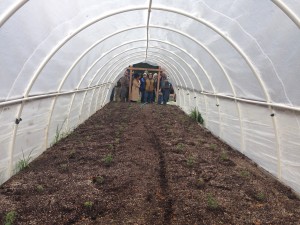
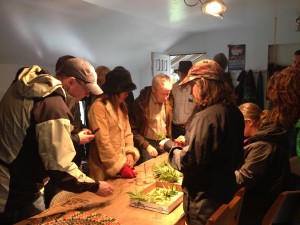
At the same time, I served on the informal board of the Humboldt and Mendocino Marijuana Advocacy Project (HUMMAP), a coalition of heritage farmers drawn mostly from the ranks of the back-to-the-land movement that pioneered the domestication of sinsemilla cannabis agriculture — and were the first subjects of its policing — in the United States.
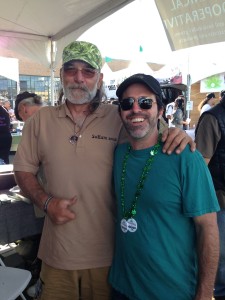
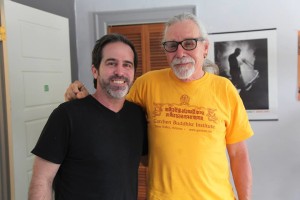
These old timers were some of the first people I met and interviewed in Humboldt County; and they also served as CCVH’s main foil during the ordinance push. Their general opposition to the ordinance process was grounded in the feeling that it was insufficiently attentive to the needs of truly small Humboldt back-to-the-land heritage farmers. I saw this as an opportunity to develop and bridge community dialogue, but left he Board of HUMMAP when the decision to litigate the ordinance was made, as I could not be party to formal legal proceedings that pit some of my friends against others. I did try to mediate by providing clear information to both sides up to that time.
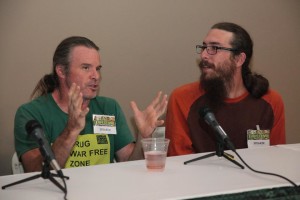
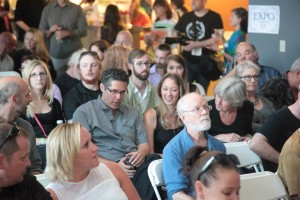
CASP 3.0 began in July, 2013. This was the month we put on our first popular education fundraiser, the Original Terpestival, which changed our outlook on what was possible both for the focused mission of our think tank and for our annual budget. The event featured Dr. Ethan Russo, the world’s foremost cannabinoid and terpene scholar as well as Vashon Island resident, as its keynote lecturer. The science of terpenes is a significant resource of industry development, both medical and recreational, and the terpene-focused Cup was the first of its kind. The overwhelming show of support from industry for learning real science was incredible, and we raised over $7,000 due to sponsorships and the donation of testing by the Wercshop.
This pulled us out of a serious budgetary hole, almost; and proved the concept of popular education could be practiced through events that combined public and private interest in an uncontroversial fashion. Board members Joy Beckerman, Aaron Varney, and Michelle Sexton were especially key to the event’s success, with special credit to Joy. By then Rachel had moved to Oregon; Don had concluded his I 502 efforts; and Naz was spending most of his time concluding his business interests in his home state of Pennsylvania until the I 502 market matured enough to be worth getting into as a processor.
During all iterations, Dr. Corva continued his work in California and Washington, without much concern for documenting and promoting what he was doing. Until we have resources to do this, Google will have to suffice. These included a paid trip to Berlin for a cannabis legalization conference keynoted by the mayor of the city; Seattle Town Hall appearances; Seattle Hempfest panel moderation, participation, and organization, and many others. I was particularly active as a public intellectual and scholar around issues pertaining to the political economy of cannabis agriculture and policing. Dr. Sexton was also extremely active as a public intellectual and scholar, especially around the subject and practice of cannabis as herbal medicine.
CASP 3.0 provided two major developments. First, Dr. Sexton’s permanent relocation to San Diego and full time commitment to full-time research (rather than running an industry lab) opened up considerable possibilities and focus for organizational restructure. This move has been especially facilitated by her work consulting for other States as they develop new medical and legal regulations.
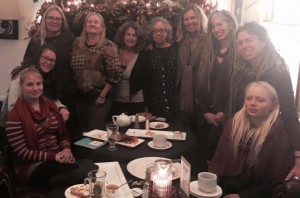
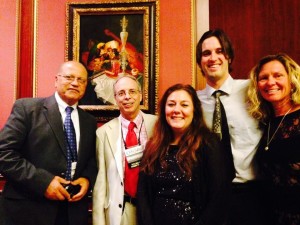
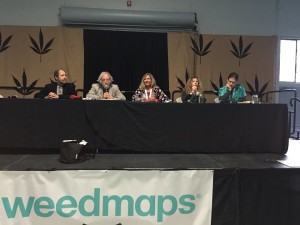
Second, Dr. Corva was enlisted at the last minute to teach two courses at the University of Washington in Fall 2015, which actually substitute-paid his salary for the year. This completed our return from budget impossibility, and fulfilled CASP’s mission to provide public sector education. It was a one-off thing, great for the organization financially but difficult to reconcile with continued organizational development. For Winter 2016, Dr. Corva was engaged even before the Fall appointment to teach “Cannabis, Law and Social Change” for the University of Washington’s Evening Degree Program. This was much more in-line with CASP organizational development, and was a sequel to a similar course developed in graduate school with Dr. Aggarwal in 2008. That 2008 class received an award from the College of Social Sciences, and we were delighted to get a second crack in an even more relevant and rich state context. Unfortunately, the University has decided to close down the Evening Degree Program in favor of online classes, and so it is unlikely to happen again unless championed as a regular day class by a tenured faculty member in a Social Science Department. And that is also quite unlikely, for many reasons. The availability of salary from that class for the first quarter of the year opened things up, however, to the engagement of two interns for a four month project. We are halfway through a book about Phase I of Washington legalization (I 502-5052).
CASP 4.0 has a razor-sharp, minimal-financial-overhead focus. Our goal is to finally be able to produce journal articles, chapters, and books based upon our experience in a field that, in practice, stretches from Washington to San Diego, California, where Dr. Sexton is setting up shop as CASP South. For this period, Dr. Sexton and Dr. Corva will serve as co-Research Directors (he’s Social Science, she’s Medicine) and share Executive Director responsibilities as they are needed. This organization will not go out of our way seeking large donors, because we don’t need them and don’t need Big Money Agendas driving our research agendas. See our new About section for more!
We are also pleased to have Dr. Aggarwal and his partner, Dr. Tapoja Chaudhuri, informally back in the circle as they have moved back to Seattle and are exploring research development opportunities. This period will see us further develop our Board, given that it has already been geographically and otherwise dispersed. Dr. Corva is looking for more community-oriented local portals to the real economy, now that Aaron Varney is the only full-time local Board member; and Dr. Sexton will be developing Board members that can support her needs as a medical cannabis researcher in California.
One final note: we have recently signed our event planner and are now producing the second Original Terpestival, a collaboration with Project CBD, in Hopland, California.
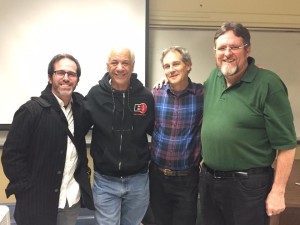
This is both a great opportunity to collaborate with a trailblazing cannabis knowledge nonprofit, and the outcome of Washington State’s criminalization of cannabis events at the end of the 2015 legislative session (this takes effect July 1, 2016, but was in law for our first iteration).
In the meantime, you can look forward to more consistent updates on this web site now that Dr. Corva’s teaching responsibilities are on indefinite hiatus. Also, don’t forget to follow our Facebook page, which has served pretty well as a micro-blog and newsfeed this whole time — we have over 2,000 likes now.
This should bring the public up to speed on our organizational fine-tuning. We are excited about this phase, which clearly defines what we do and how we do it, because the field has developed well enough for us to understand how to provide unique and focused content while maintaining our general mission of public and policymaker education.

All very interesting Dr. Corva!